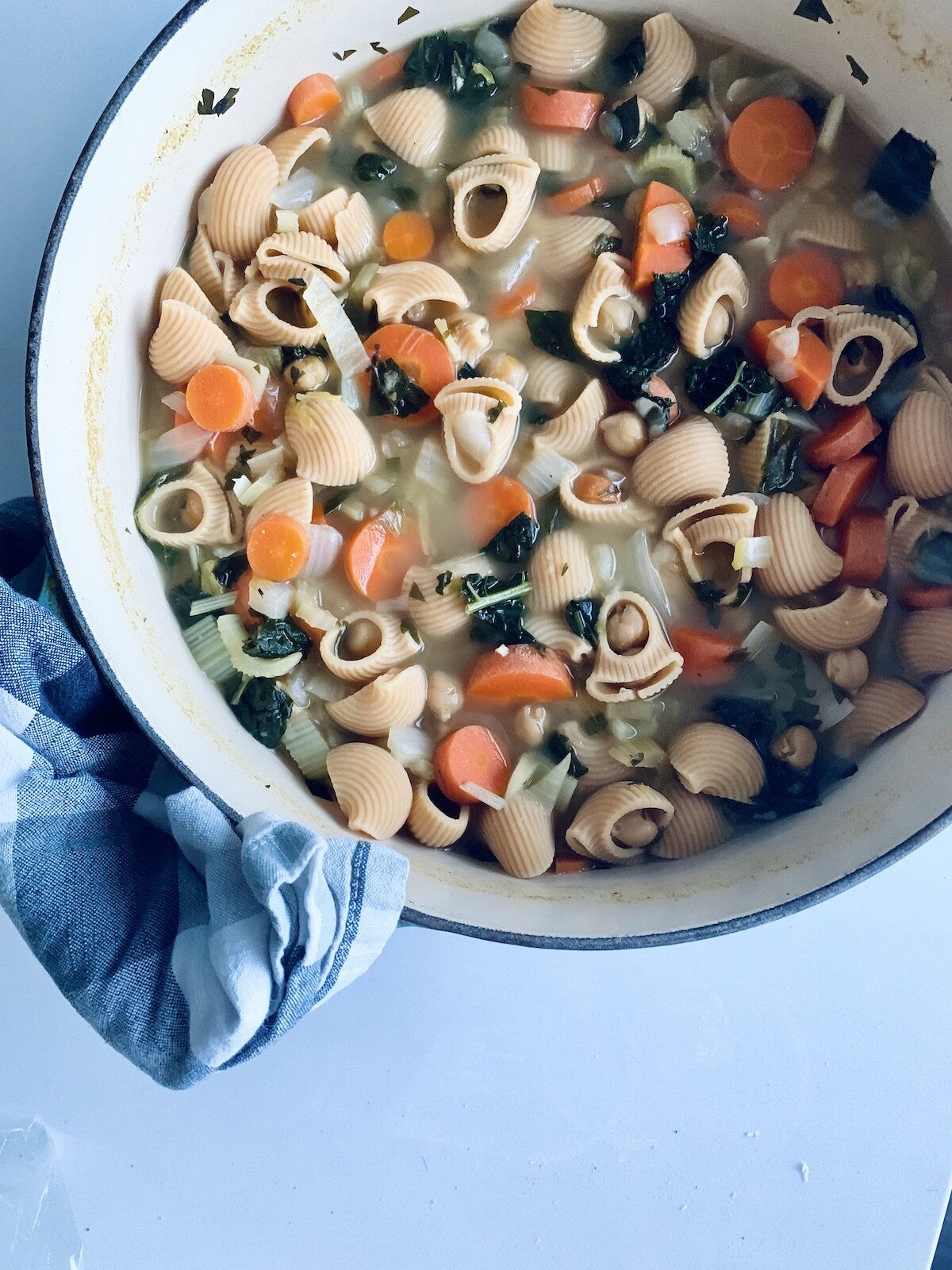If you’ve heard of intuitive eating, you’ve also likely heard of the tenth principle of intuitive eating, “gentle nutrition”. Learning to incorporate sound nutrition advice is a key part of the intuitive eating journey. Gentle nutrition is all about eating nutritious foods, navigating health conditions, and developing overall healthy habits WITHOUT dieting, strict food rules, or missing out on favorite foods.
If you’re curious about how to walk the line between tending to your physical health and honoring your personal preferences and pleasure, then this post is for you! Let’s talk about what gentle nutrition is and how to practice it as a plant-based woman.

Gentle Nutrition and Intuitive Eating
Gentle nutrition is the tenth and last principle of intuitive eating. (New to intuitive eating? Read this post!) A lot of people think that intuitive eating is an “eat whatever you want” philosophy. But eating intuitively doesn’t mean giving up on nutrition! Gentle nutrition is the intuitive eating way of integrating evidence-based nutrition guidelines into your life.
It’s the final principle on purpose because the founders of intuitive eating believe that in order to apply gentle nutrition, you have to move through the other nine principles first. However, many of the women I work with who are facing health concerns or are in a phase of life like pregnancy don’t have the luxury of putting nutrition on hold. If you’re a plant-based eater, your need to address nutrition may also feel more urgent so that you can eat in alignment with your values as soon as possible and know that you are meeting your needs as you do.
What is gentle nutrition?
Gentle nutrition serves as the bridge between honoring your body’s natural cues and integrating nutrition knowledge into your eating practices. Defined within the framework of Intuitive Eating, it encourages a balanced approach that focuses on nourishing the body without the constraints of traditional diets. Gentle nutrition emphasizes that eating should not be dictated solely by strict food rules but rather by a combination of informed choices that align with one’s personal preferences, health goals, and emotional wellbeing.
At its core, gentle nutrition invites you to listen to your body and make choices that support long-term health rather than short-term results. This means appreciating the nutritional value of foods while also recognizing the pleasure and satisfaction that comes from enjoying a diverse range of foods, including those deemed as ‘play foods’ or treats. The goal is to cultivate a positive relationship with food, where you can enjoy meals without the weight of guilt or anxiety, and instead focus on how different foods make you feel.
Gentle nutrition also emphasizes flexibility. Unlike restrictive diets that often lead to feelings of deprivation, this approach encourages experimentation and adaptation based on one’s daily experiences and evolving needs. For example, you may find that certain foods energize you while others may leave you feeling sluggish. By paying attention to these responses, you can make choices that support their physical and emotional health in a way that feels empowering rather than limiting.
Moreover, gentle nutrition recognizes that external factors such as lifestyle, life phase, cultural influences, and food availability play significant roles in our eating habits. It gives you full permission to consider these factors when making food choices, allowing for a more holistic approach to nutrition that respects your individual circumstances. This might look like leaning on convenience foods to ease the burden of meal prep when you’re raising young kids or ordering something from a restaurant menu that you don’t normally eat so that you can enjoy the experience of dining with friends.
Gentle nutrition is not about rigid rules or counting calories; it’s about fostering a nurturing relationship with food that honors both health and enjoyment. By practicing it, you can move towards a more balanced and fulfilling approach to eating—one that celebrates both nourishment and pleasure, ultimately promoting overall wellbeing.
Key Principles of Gentle Nutrition
- Evidence-based Nutrition: Integrating nutrition guidelines that are rooted in solid evidence instead of trying every fad diet and nutrition trend.
- Honor Hunger and Fullness: Recognizing and respecting your body’s signals of hunger and fullness to make informed choices about when and how much to eat.
- Nutrition as a Guide, Not a Rule: Using nutritional principles to guide food choices without imposing strict rules or restrictions that can lead to diet mentality.
- Focus on Well-Being: Prioritizing overall health and well-being rather than aiming for a specific weight or appearance-based outcomes.
- Personal Values: Integrating personal values into food choices, such as ethical, spiritual, or health-related principles (e.g., veganism).
- Balance and Variety: Striving for a balanced diet that includes a variety of foods to meet nutritional needs while still allowing for pleasure and enjoyment in eating.
- Flexibility and Context: Ability to have flexibility in food choices to accommodate changing circumstances, cravings, and preferences, and the ability to consider the context of a situation or life phase rather than attempting to adhere to rigid rules at all costs.
- Building Sustainable Habits: Focusing on developing sustainable, healthy eating habits that make sense for the long-term rather than short-term diets.
- Pleasure: Recognizing the importance of pleasure in food, including the enjoyment of flavors and textures, eating environment, and food memories and traditions.
- Satisfaction: Choosing foods that help you feel the way you want to feel – energized, content, satiated, grounded.
- Personalization: Understanding that nutrition is personal, and each person’s needs are a little bit different; thus, choices should reflect individual health needs, preferences, and lifestyles.

Gentle Nutrition and Plant-based Eating
You may be wondering, “how do you practice gentle nutrition if you’re plant-based?” Plant-based nutrition is no secret to diet culture, pseudoscience fads, and rigid rules (read more about plant-based diet culture here). Plant-based eaters can simply apply the principles above to their eating – following evidence-based advise and ditching fads, honoring their personal preferences, desires, body cues, and needs around food (even when those things fly in the face of standard guidelines), including an abundance of plant-based foods, and leaving room for flexibility and context in their food choices.
Here are a few more specific ways you can start practicing gentle nutrition as a plant eater.
6 Ways to Practice Gentle Nutrition For Plant-based Women
- Focus on adding, not subtracting: Where can you add a fruit, vegetable, or bean to a meal or snack?
- Make simple swaps that help you feel the way you want to feel: Swap white rice for brown rice for a more fiber-filled and satiating meal.
- Eat enough and eat regularly: Make sure you’re eating enough food every day and eating when you feel hungry. Not only will this help you feel better overall, it also helps you meet your nutrition needs.
- Know your key nutrient needs and take necessary supplements: Meeting needs for nutrients like vitamin B12, iron, protein, and calcium is important for plant-based women. Understand your needs, which foods will help you meet home, and what supplements you may need to fill in any gaps.
- Eat balanced meals: Aim to include a balance of foods from the four foods groups (beans/legumes, grains/starches, produce, nuts/seeds/other fats.
- Get your nutrition information from evidence-based experts (a.k.a., dietitians!): Did you know doctors get less than 10 hours of nutrition education in their ENTIRE training?! Same goes for most health coaches, “nutritionists”, and other self-proclaimed experts. They may be very good at other things like diagnosing and treating illnesses, behavior change, or creating recipes, but just because someone eats food or is interested in nutrition doesn’t mean they have the knowledge-base to make nutrition recommendations. Registered dietitians are uniquely qualified to sort through the B.S. and deliver evidence-based, pragmatic nutrition guidance.
Want help putting gentle nutrition into practice?
Check out the Plant-based Basics For Women Course – a diet-free guide to confidently meeting your needs as a plant-based woman.


